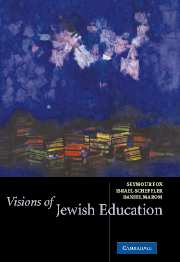Book contents
- Frontmatter
- Contents
- Preface and Acknowledgments
- About the Mandel Foundation
- Introduction
- Part I The Visions Project
- Part II Visions in Detail
- Introduction
- 4 What Must a Jew Study – and Why?
- Supplement: Isadore Twersky
- 5 Jewish Studies in Israel from a Liberal-Secular Perspective
- Supplement: Menachem Brinker
- 6 We Were as Those Who Dream: An Agenda for an Ideal Jewish Education
- Supplement: Moshe Greenberg
- 7 Reflections on the Educated Jew from the Perspective of Reform Judaism
- Supplement: Michael A. Meyer
- 8 Educated Jews: Common Elements
- Supplement: Michael Rosenak
- 9 The Concept of the Educated Person: With Some Applications to Jewish Education
- Supplement: Israel Scheffler
- Part III Visions in Context
- Conclusion: The Courage to Envision
- The Visions Project: Participants and Forums
- Index
6 - We Were as Those Who Dream: An Agenda for an Ideal Jewish Education
Published online by Cambridge University Press: 08 January 2010
- Frontmatter
- Contents
- Preface and Acknowledgments
- About the Mandel Foundation
- Introduction
- Part I The Visions Project
- Part II Visions in Detail
- Introduction
- 4 What Must a Jew Study – and Why?
- Supplement: Isadore Twersky
- 5 Jewish Studies in Israel from a Liberal-Secular Perspective
- Supplement: Menachem Brinker
- 6 We Were as Those Who Dream: An Agenda for an Ideal Jewish Education
- Supplement: Moshe Greenberg
- 7 Reflections on the Educated Jew from the Perspective of Reform Judaism
- Supplement: Michael A. Meyer
- 8 Educated Jews: Common Elements
- Supplement: Michael Rosenak
- 9 The Concept of the Educated Person: With Some Applications to Jewish Education
- Supplement: Israel Scheffler
- Part III Visions in Context
- Conclusion: The Courage to Envision
- The Visions Project: Participants and Forums
- Index
Summary
The Jewish component in the education of the Jewish child, in Israel as in the Diaspora, plays a decisive role in the formation of his identity. The shape of this component will determine the shape of the child's Jewishness – the awareness that he is heir to a tradition rich in values, one that invites him to fulfill himself through it.
Underlying this essay is an image of the learner as a creature impelled by curiosity concerning the world about him and his own inner life – the meaning of what his senses take in. The need to know these is second only to basic subsistence needs (food, shelter, health, reproduction). The desire to know and understand is implanted in human nature from infancy, and what the child learns in school must satisfy that desire, through a curriculum crafted accordingly.
Knowledge of the facts of the nonhuman, material, natural world is necessary for human existence. The sciences, such as physics or chemistry or biology, are the great repositories of such knowledge. To achieve mastery in the sciences is to satisfy curiosity and acquire the means to benefit – or harm – civilization. But knowledge of the nonhuman realm, be it ever so profound, does not enable one to understand oneself – the structure of one's psyche: its needs, aspirations, fears and hopes, and the realms of value and significance.
The soul knows no rest until it gains some comprehension of, and makes some order in, the realm of value.
- Type
- Chapter
- Information
- Visions of Jewish Education , pp. 122 - 132Publisher: Cambridge University PressPrint publication year: 2003
- 3
- Cited by



